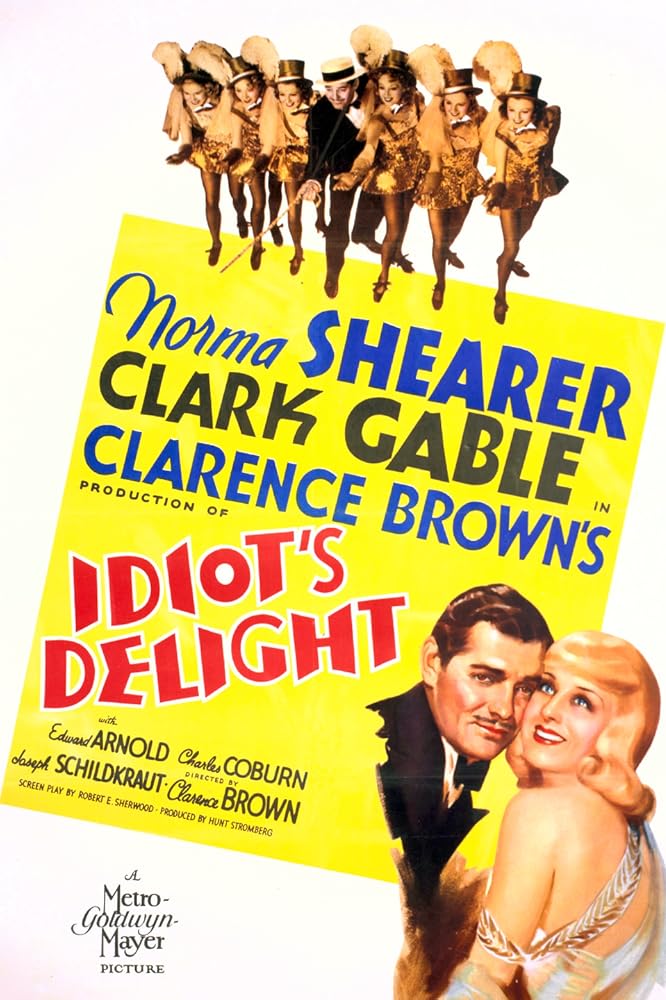
IDIOT’S DELIGHT
(director: Clarence Brown; screenwriters: from the play Idiot’s Delight by Robert E. Sherwood/Robert E. Sherwood; cinematographer: William Daniels; editor: Robert J. Kern; music: Herbert Stothart; cast: Clark Gable (Harry Van), Norma Shearer (Irene Fellara), Edward Arnold (Achille Weber), Charles Coburn (Dr. Waldersee), Joseph Schildkraut (Capt. Kirvline), Burgess Meredith (Quillery), Laura Hope Crewes (Mme. Zuleika), Peter Willes (Mr. Cherry), Pat Paterson (Mrs. Cherry), William Edmunds (Dumptey); Runtime: 107; MPAA Rating: NR; producer: Hunt Stromberg; MGM; 1939)
“An unfulfilling adaptation of Robert E. Sherwood’s Pulitzer Prize-winning play.”
Reviewed by Dennis Schwartz
An unfulfilling adaptation of Robert E. Sherwood’s Pulitzer Prize-winning play, which was excellently performed on Broadway by the Lunts. But what is even more surprising is why it lays such an egg, especially, since the playwright was the screenwriter. One of the main reasons has to be the casting decision of Norma Shearer; her grating performance added to the already artificial contrivances of the plotline and her romance with Clark Gable had no heat or convincing reason for them being linked together romantically. This was the last time they were teamed together. Under Clarence Brown’s uneven direction the anti-war political message in its call for world peace, the suggestion that American lack of world leadership was responsible for the conditions that led to war, and the film’s commentary against Hitler were all too weakly delivered to be effective arguments. The film plodded ahead to surpass its awkward pacifist message with a just as dull romance story, and ended up failing on both counts to score. Though the film is worth seeing for one memorable scene of Gable in a top hat and tux hoofing with his all-girl troupe of six blondes (called Harry Van’s Les Blondes) and singing “Puttin’ on the Ritz.” This was the only time he danced and sang in a movie, and though he proved he’s no Astaire–the routine was nevertheless very entertaining.
Cocky Harry Van (Clark Gable), a man of the people, returns from WW I with a good record, but can’t land a gig as a song-and-dance man on Broadway. He drifts into other rackets such as working a street con game and selling encyclopedias, until he finally lands a minor showbiz gig as the assistant to the elderly Mme. Zuleika in a mind reading act. During one performance in an Omaha theater, mind reader Zuleika is too drunk to perform and is prompted by acrobat performer Irene (Norma Shearer), which is detected by the audience and causes displeasure to both Harry and Zuleika. When the grasping Irene comes to Harry’s dressing room, she fawns over him and hopes to move upward by getting him to teach her ‘the code’ to his act and forming a partnership with her. Instead of that, he has a one week stand with her and they depart in different directions to pursue their careers in 1929 optimistic they will soon get back together again. But the years pass on until it’s 1939, and the struggling Harry has never made it to the top. Harry formed a traveling all-girl troupe vaudeville act, Les Blondes, that he manages and acts in as a broken-down hoofer. On the eve of WW11, while on a European tour, the train the apolitical Harry is on can’t pass the frontier and take him to Geneva, Switzerland, where his troupe is booked in a nightclub. The troupe ends up stranded in a luxurious alpine hotel bordering an Italian air base, where a variety of guests from all over the world are staying such as Charles Coburn as a German scientist who abandons his research in cancer to return to the homeland to build better bombs, Joseph Schildkraut as the courtly German Captain in charge of the area, and Burgess Meredith as the obnoxious American pacifist who can’t shut his pie hole. The guest that gets Harry’s full attention is a woman in a platinum blonde wig and speaking with a phony Russian accent (doing an incredibly bad imitation of Lynn Fontanne doing a Garbo impersonation) while posing as a Russian countess, who is accompanied by a corrupt wealthy munitions dealer named Achille Weber (Edward Arnold). She pretends not to recognize Harry and he plays along with Irene’s act, amused at her antics.
When the war is declared, all the guests abandon the hotel. But Irene gets her comeuppance for choosing ambition over love, as her munitions dealer dumps her. He’s not concerned that she can’t travel (for some unexplained reason she has an invalid passport), and she bravely pretends everything is just fine. The only one who stays to keep her company while the enemy planes drop bombs near the hotel is Harry, who after he makes sure his troupe is safely out of danger returns to sing hymns with her while the bombs fall. The film ends on the Hollywood-like happy note that love conquers all and will save even idiots who fall in love.
By the end the film is reduced to a predictable mushy romance and the political arguments over idealism are left hanging as afterthoughts about how futile it is to try and save the world.
This gutless political comedy is noted for having two different endings, one for American audiences and one for a European audience.
REVIEWED ON 1/29/2005 GRADE: C https://dennisschwartzreviews.com/